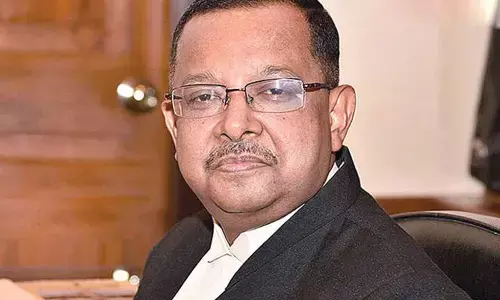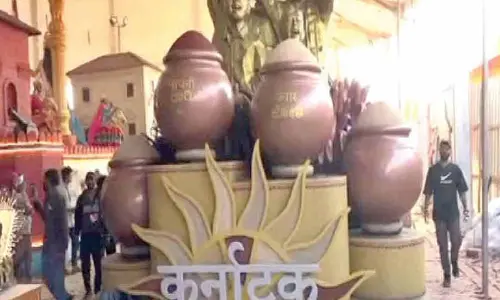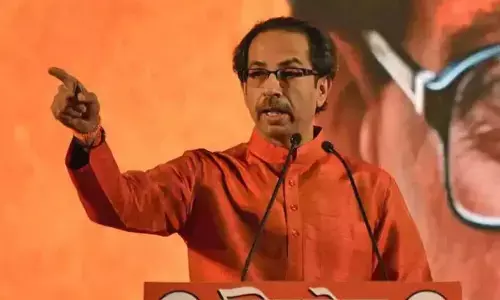CAA deprives smooth ride for fanatic, secessionist elements

The much-awaited Citizenship Amendment Act (CAA) has been passed by both houses of Parliament and it has also received the President's assent. Now, it has become the law of the land.
The much-awaited Citizenship Amendment Act (CAA) has been passed by both houses of Parliament and it has also received the President's assent. Now, it has become the law of the land.
The new Act offers the much-needed help to the persecuted Hindus, Jains, Sikhs, Christians and Parsis by fanatic Muslims of Pakistan, Afghanistan and Bangladesh who officially follow Islam as State religion.
It is, indeed, strange that some misguided fanatic Muslims in India, knowing it fully well that their interests are not affected by the new Act, still foment trouble in some pockets of the country like Assam, Meghalaya and other illegal migrants dominated north - eastern States.
With their eyes on the vote bank, some political parties add fuel to the fire, as a result of which violence has erupted in these pockets.
Now there comes the news that the State governments of West Bengal, Punjab and Kerala have openly announced that they would not obey the new Law.
This is really a serious matter. Not following the law of land, duly passed by Parliament is a criminal offence and would tantamount to treason. Nobody is above the law, be it just a citizen or a political monster.
The rule of law should prevail. Hope, the Central government would ensure peace and safety of the people at any cost and take stringent action against those who defy the law and incite mob violence.
The feeling of defiance of the law has its deep roots in the unerasable historical prejudice against the Hindu population.
The anti-majority elements have been living in a fool's paradise that they can browbeat the vast majority of Hindus and continue the decade old practice of arm-twisting, particularly in the changed circumstances.
Now that the times have changed, it is high time that the historical errors committed by our leaders of the yesteryears were corrected.
After this landmark legislation, other game changing legal measures such as National Register of Citizens, Uniform Civil Code, scrapping of the Minorities Commissions at the Central and State levels and banning noise pollution through high volume loud speakers in places of worship in blatant violation of the apex court judgement delivered by the bench headed by the then Chief Justice of India Justice R C Lahoti should be initiated without losing time.
In this process, obviously, many vested interests will have to be tackled and the arrogant, fanatic and secessionist anti -national elements will have to be shown their rightful places.
SC forms probe panel
The Supreme Court of India appointed a three-member probe committee headed by the retired judge of the same court Justice V S Sirpurkar to investigate into the encounter of four rape accused in Disha rape and murder case.
Other members of the probe committee are: Justice Rekha Baldotra, former Judge of the Bombay High Court, and former Director of the CBI Karthikeyan.
The court granted six months to complete the probe while making it clear that no other probe will be carried out in the subject matter.
The encounters had generated instant public applaud throughout the country, though feeble voices from some well-informed quarters, including legal fraternity, were raised against the way in which police handled the entire issue.
Ayodhya verdict: Near finality
The apex court has dismissed 18 review petitions filed against historical Ayodhya Ram Mandir verdict delivered by it on November 9.
But this does not mean that the Judgement has attained finality. The aggrieved parties, may be some of them, would certainly explore the last legal remedy, called the Curative petition. Of course, there are very thin chances of success in such a petition.
After crossing this final hurdle, all doors of judiciary would be closed for the aggrieved parties. Whatever the outcome of the legal process be, by dragging the matter up to its last stage, the petitioners have certainly lost goodwill of Hindus.
Legality apart, had the warring Muslim litigants stuck to their pre-verdict public assurance that they would honourably accept the court verdict, the much-needed atmosphere of communal harmony could have been created.
Fined for forgery
The Bombay High Court in a case of forgery has imposed cost of Rs.10,000 on three petitioners while rejecting their plea to withdraw the writ petition and also directed registration of a criminal case against them in the magistrate court.
The issue was brought to the notice of the court by the counsel for the respondent who said that the thumb impression on the vakalatnama filed by the petitioners was not of the fourth petitioner who is not living in India.
The counsel also contended that the fourth petitioner had not given his consent to file the writ petition in question and further that after the fourth petitioner learnt about the forgery, a police complainant was filed by him under his own signature.
AP passes Disha Bill
The Andhra Pradesh assembly on December 13 passed two Bills, namely, The Andhra Pradesh Disha Bill-Criminal Law (Andhra Pradesh) Amendment Bill, 2019 and the Andhra Pradesh Disha Bill- Andhra Pradesh Special Court for Specified Offences Against Women and Children Bill, 2019.
The Bills provide for expeditious investigation and time-bound disposal of cases relating to the offences against women and children.
The Bill reduces the judgement period to 21 working days with investigation being completed in seven days and trial concluding in 14 days.
Though the intention of the government seems to be good by providing for the speedy trial, it remains to be seen how quickly quality investigation and quality justice would be delivered.
Even the Chief Justice of India has expressed reservations about the speedy justice earlier.















